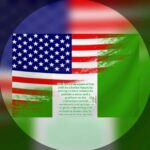Nigeria-America Initiative

Building a bilateral relationship between America and Nigeria-America Initiative. It’s time to be a part of the Paradigm shift to a better future by joining us on a mission to provide a voice and a platform to the underrepresented individuals and groups in Nigeria-America, organizing and providing leadership for the future of the country – Join Us Today
Nigeria -American Newsletter : The Nigerian Diaspora in the United States
Approximately 376,000 Nigerian immigrants and their children (the first and second genera- tions) live in the United States, and Nigeria is the largest source of African immigration to the United States.
The size of the Nigeria-born population in the United States has grown from
a small base since 1980, when an estimated 25,000 Nigerian immigrants were U.S. resi- dents. Today, Nigerian immigrants account for about 0.6 percent of the United States’ overall foreign-born population, about half of whom arrived before 2000. A similar proportion of Nigerian immigrants are naturalized U.S. citizens.
The Nigerian diaspora is the best educated of the 15 groups in the Rockefeller Foundation- and second generation earned undergraduate degrees than the U.S. population overall (37 percent versus 20 percent), and members of this population are more than twice as likely to have secured an advanced degree (29 percent versus 11 percent).
Members of the Nigerian diaspora are also substantially more likely than the general U.S. population to be in the labor force and to work in professional or managerial occupations. Despite such educational and professional advantages, households headed by a member of the Nigerian diaspora have only a slightly higher median annual income than the general U.S. population ($52,000 versus $50,000), and Nigerian households are no more likely than other U.S. households to be in the highest quartile or decile of the U.S. income distribution.
The largest numbers of Nigerian immigrants in the United States reside in Texas, Maryland, and New York. By metropolitan area, New York City has the largest Nigerian immigrant popu- lation, followed by Houston and Washington, DC. In no major metropolitan area do Nigerian immigrants make up more than 0.3 percent of the population.
The Nigerian diaspora has begun to build a network of organizations in the United States. Reflecting the relatively small and recently arrived nature of the Nigerian immigrant popu- lation, U.S.-based Nigerian diaspora groups tend to be volunteer-led organizations with modest revenue streams.-
A far greater share of the Nigerian first
Nigerian diaspora.
Actions take a number of forms, including societies that promote the development of Nigeria, the arts and culture of the homeland, women’s empowerment, or the provision of health and other social services to Nigeria’s most vulnerable populations. Many of these groups focus on a shared subnational ethnic identity, such as Yoruba or Igbo, a testament to Nigeria’s wealth of linguistic and cultural traditions. The People’s Club of Nigeria, the Foundation for Democ- racy in Africa, the Anambra State Association, and the Elegba Folklore Society are among the United States’ most prominent Nigerian diaspora groups. The Nigerian in Diaspora Organiza- tion (NIDO), founded by diaspora members at the urging of the Nigerian government, also has several chapters in the United States under the umbrella of NIDO Americas, and collaborates closely with the Nigerian Embassy and other government structures.
The United States is the primary destination country for Nigeria-born international migrants and the top source of Nigeria’s remittances. The Nigerian diaspora in the United States trans- ferred approximately $6.1 billion in remittances to Nigeria during 2012. Nigeria’s remittances totaled $20.6 billion and represented 7.9 percent of the country’s $262.2 billion gross domes- tic product (GDP).
Detailed Demographic and Socioeconomic Characteristics2
Analysis of data from 2009-13 reveals a Nigerian diaspora in the United States of approxi- mately 376,000 individuals, counting immigrants born in Nigeria and U.S.-born individuals with at least one parent who was born in Nigeria.
- First Generation (Nigerian immigrants in the United States)
An estimated 213,000 immigrants from Nigeria resided in the United States. - Nigerian immigrants accounted for a small share of the U.S. foreign-born population overall—0.6 percent in 2012. The size of the Nigeria-born population in the United States grew from a small base in recent decades; in 1980, about 25,000 Nigerian immigrants.
- A relatively high proportion of the Nigerian immigrant population arrived in the United States recently: 49 percent arrived in 2000 or later versus 36 percent of the U.S. foreign-born population overall.
- Nigerians were more likely to be naturalized U.S. citizens than the U.S. foreign-born population overall: 52 percent versus 44 percent. Considering that about half of Nigerian immigrants arrived in the United States in 2000 or later, their relatively high naturalization rate suggests that many Nigerian immigrants applied for U.S. citizenship shortly after they became eligible.
- Eighty-three percent of first-generation Nigerian immigrants were working age (18 to 64), and only a small share was 65 and older (5 percent). The median age of Nigerian
Unless otherwise noted, estimates for the diaspora population and its characteristics are based on Migration Policy Institute (MPI) analysis of the U.S. Census Bureau’s Current Population Surveys (CPS), using five years of pooled data (2009 through 2013) collected in March of each year. All Census Bureau data were accessed from Integrated Public Use Microdata Series (IPUMS), Steven Ruggles, J. Trent Alexander, Katie Genadek, Ronald Goeken, Matthew B. Schroeder, and Matthew Sobek, Integrated Public Use Microdata Series: Version 5.0 [Machine-readable database], Minneapolis: Univer- sity of Minnesota, 2010), http://usa.ipums.org/usa/. - The second-generation Nigerian population consisted of approximately 163,000 U.S.- born individuals with at least one Nigeria-born parent.
- Sixty-two percent of second-generation individuals reported that both parents were born in Nigeria, and 25 percent said that one of their parents was U.S.-born.
- The Nigerian second-generation population in the United States tends to be young, with a median age of 13. Sixty-three percent of the second generation was below age 18, and 37 percent was working age (18 to 64).
Educational Attainment. - The Nigerian diaspora in the United States was highly educated, with a large proportion of Nigerian diaspora members holding bachelor’s or advanced degrees.
- Thirty-seven percent age 25 and older had a bachelor’s degree as their highest educational credential, compared to 20 percent of the general U.S. population.
- Twenty-nine percent of the Nigerian diaspora age 25 and older held a master’s degree, PhD, or an advanced professional degree compared to 11 percent of the U.S. popula- tion overall.
Household Income. - Households headed by a member of the Nigerian diaspora had a slightly higher median annual income than U.S. households overall. The median annual income of Nigerian diaspora households was about $52,000 versus $50,000 for all U.S. households.
- Nigerian diaspora households and U.S. households were equally likely to be in the higher income brackets. Twenty-five percent of households in both of these groups reported annual incomes greater than $90,000, and 10 percent reported annual income exceeding $140,000.
Employment. - Nigerian diaspora members age 16 and older were more likely than the general U.S. population to be in the labor force: 73 percent versus 64 percent.
- The employment rate among those in the labor force was nearly the same for the Nige- rian diaspora as the U.S. population overall: 88 percent versus 91 percent.
- Members of the Nigerian diaspora were employed in professional or managerial occupations at a higher rate than the general U.S. labor force: 46 percent versus 31 U.S. born is defined as born in the United States or born abroad to a U.S.-citizen parent.
5 This rate is calculated based on the share of all individuals reporting an occupation for their primary job at the time the
CPS was administered, or their most recent primary job.
Migration Policy Institute 3
Nigerians worked in professional or managerial occupations. These occupations include specialized fields (e.g. engineering, science, law, or education) as well as administrative and managerial jobs (e.g. finance or human resources).
Geographic Distribution. - With about 40,000 Nigeria-born residents, Texas had the largest population of Nigerian immigrants of any state in the country. New York and Maryland each had about 25,000 first-generation Nigerian residents.
- About 35,000 Nigerian immigrants lived in the New York City metropolitan area. The Houston; Washington, DC; and Atlanta areas each had Nigeria-born populations of approximately 20,000.
Remittance. - Remittance receipts to Nigeria in 2012 were valued at $20.6 billion, representing a 7.9 percent share of the country’s $263 billion GDP.
- Both Nigeria’s GDP and remittance receipts have grown rapidly in recent years. In 2003, the country’s remittance receipts were $2.3 billion, and GDP was $67.7 billion.
- The Nigerian diaspora in the United States transferred about $6.1 billion in remit- tances to Nigeria in 2012, making this U.S.-based population Nigeria’s largest source of remittance inflows. The United States is home to the largest number of Nigerian- born immigrants of any country in the world, followed by the United Kingdom and Cameroon.
Analysis based on the U.S. Census Bureau’s 2008-12 ACS. Note that geographic distribution is only analyzed for the immigrant population. Second-generation Nigerian diaspora members are not included in this section due to data limitations.
Remittance data are taken from World Bank Prospects Group tables for annual remittance inflows and outflows (October 2013 update) and the 2012 Bilateral Remittance Matrix (both available here: http://go.worldbank. org/092X1CHHD0). GDP estimates are from World Bank World Development Indicators data. Population estimates are from the United Nations Population Division mid-2013 matrix of total migrant stock by origin and destination.
https://www.facebook.com/groups/316956828886194
Nigerians Stand for Good Governance

Nigerians stand for good governance is not a political party nor have affiliations with any political group/parties in Nigeria or international.
Our cardinal goal is to support true democratic process and charged government holders to be accountable of their stewardship while we promote community development, Youth projects and form alliance with organisations in executing quality innovation and ideas.
https://www.facebook.com/groups/sng2011

